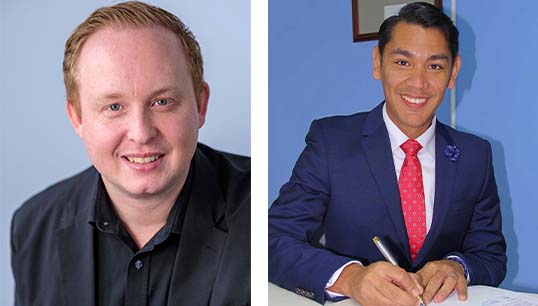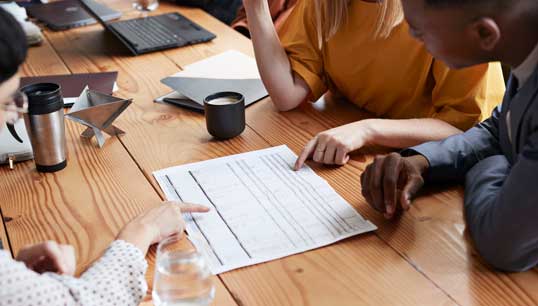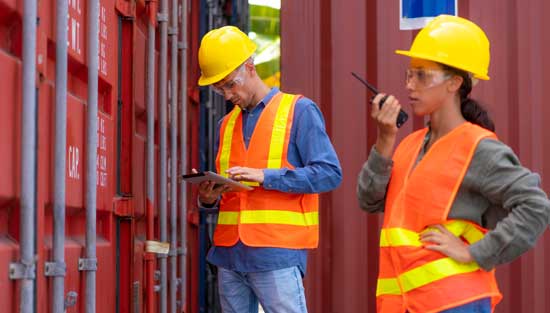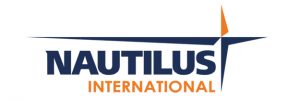- Topics
- Campaigning
- Careers
- Colleges
- Community
- Education and training
- Environment
- Equality
- Federation
- General secretary message
- Government
- Health and safety
- History
- Industrial
- International
- Law
- Members at work
- Nautilus news
- Nautilus partnerships
- Netherlands
- Open days
- Opinion
- Organising
- Podcasts from Nautilus
- Sponsored content
- Switzerland
- Technology
- Ukraine
- United Kingdom
- Welfare

Inclusive national policies don't necessarily translate into global protections for LGBT+ seafarers, so how can the maritime workplace be made safer for maritime workers? Deborah McPherson asked the question of Nautilus official Danny McGowan and researcher and former shoreside maritime worker Gustavo Abdiel Aguilar-Miranda ahead of the first UK Pride in Maritime Day on 28 February 2022
Towards the end of 2021, a Maritime UK Pride in Maritime network meeting heard that countries where human rights are under assault may pose difficulties for LGBT+ maritime professionals.
There is understandable concern about how to protect crew or other workers who must travel for their careers to countries with poor records on treatment of LGBT+ workers. The International Lesbian, Gay, Bisexual, Trans and Intersex Association (ILGA World), a global federation of LGBT+ organisations, conducts work in various United Nations forums and publishes regular mapping data on 'state-sponsored homophobia'. In 2020, it found that around one-third of UN member states still criminalise same-sex consensual sex between adults, including several countries where the death penalty may be applied.
Nautilus official Danny McGowan is secretary of the Union's Equality and Diversity Forum and formerly chair of the Maritime UK Pride in Maritime Network. He points out that assaults on some rights are an assault on all our rights:
'LGBT+ maritime professionals face specific concerns in the shipping industry, and raising the issues is about protecting the rights of all seafarers. It is about enabling LGBT+ maritime professionals to work without fear of discrimination or ill treatment and ensuring they can be their genuine selves at work.'
Harassment and discrimination are key considerations for some crew, he added, in that LGBT+ maritime workers are likely living onboard with seafarers of different nationalities, who may or may not have similar societal beliefs or similar levels of respect for LGBT+ people – perhaps because of the laws in their home countries.
'Nautilus wants to see companies offering reassurance to LGBT+ seafarers that the company has their back when and if they have to travel to different jurisdictions with different laws and different beliefs,' says Mr McGowan.
Having diversity policies is also important in ensuring reassurance and protecting employees, he says.
'A company doesn't necessarily need to know who all its LGBT+ seafarers are, but it can have a diversity policy in place that references support. That would communicate to LGBT+ maritime professionals that they are safe when they are at work; that a company recognises it works globally; that there are different needs for different people; that it values LGBT+ employees; and that it can offer ways to address concerns about postings or itineraries.'
Whether a Union member's employer is responsive on these issues or not, Mr McGowan is clear that Nautilus is ready to help: 'We want LGBT+ seafarers to come and speak to Nautilus openly about any concerns they have, and they will receive support from their industrial organiser. If they want to speak to somebody else directly on diversity, I'm there to assist members who have specific concerns.'
'LGBT+ maritime professionals face specific concerns in the shipping industry, and raising these issues is about protecting the rights of all seafarers' Danny McGowan, secretary of the Nautilus Equality and Diversity Forum and chair of the Maritime UK Pride in Maritime Network
Mapping your rights
The ILGA offers regular data on legislation around the world, in various languages.
The ILGA World map is supported by the data* collected in its report: State-Sponsored Homophobia 2020: Global Legislation Overview Update.
*As it was published in December 2020, the latest developments – including the decriminalisation of consensual same-sex sexual acts between adults in Bhutan, and the introduction of marriage equality in Switzerland and Chile are not included.
The Kaleidoscope International Trust has created a similar map to show where in the Commonwealth global LGBT+ rights are recognised. The Kaleidoscope database also provides advocates with information on how to use the Convention on the Elimination of All Forms of Discrimination against Women (CEDAW) to advocate also for LGBT+ rights.
Travel challenges for LGBT+ workers
Newcastle University student Gustavo Abdiel Aguilar-Miranda – who worked shoreside in Panama before moving to the UK – has helped to shine a light on potential travel issues for LGBT+ maritime professionals*
What is your I Exist Too project about?
My project explores the lived experiences of LGBT+ employees in Panama's maritime sector, including attitudes of stakeholders towards LGBT+ people and how these attitudes impact life histories, future prospects, sense of identity and wellbeing.
As a gay Panamanian who has witnessed and experienced personal and professional discrimination within Panama's maritime sector, I have a special interest in contributing to the advancement of LGBT+ rights in our nation, especially its maritime sector, where we should all be respected, welcomed and accepted.
What legal rights and resources are there globally for LGBT+ seafarers who must travel for their careers to destinations where human rights are under assault?
Different non-governmental organisations offer resources and advice to safeguard and protect LGBT+ people in both their country of origin and destination.
The question is, what protections do companies offer their seafarers when they go to destinations where being part of the LGBT+ community is illegal, and especially countries where it is penalised with death?
What programmes and policies exist within these organisations that promote safe spaces? Do the companies know how many LGBT+ employees they have? How do companies monitor the captain's HR management in terms of inclusion?
There are many fundamental tasks that still must be done.
How do you think LGBT+ rights have changed for seafarers over the last five to 10 years?
Much has been achieved regarding the recognition and protection of the rights of LGBT+ people. However, we still have around one-third of UN member states still criminalising consensual same-sex acts.
Have people been more willing to talk about seafarer gender identity and sexuality in the last 10 years?
Many non-governmental organisations and activists have made sustained efforts to secure the rights of LGBT+ people worldwide, and this has also permeated the maritime sector. For instance, Maritime UK has established a Pride in Maritime Network, a safe space in which it welcomes multidisciplinary specialists who seek greater inclusion, equality, and respect within this sector for all minorities.
However, it is vital that this conversation transcends all spaces, especially the different maritime organisations, flag states, and the IMO and its technical committees.
The International Labour Organization (ILO) has conventions which, although they do not mention LGBT+ within their text, can be used in favour of the LGBT+ community. These are Conventions 111, 190, 155, and 202, dealing with discrimination in employment, violence and harassment, occupational health and safety and social protections. ILO Convention 111, for example, deals with discrimination in employment.
It is an issue that must be further studied, evaluated, and included within the Maritime Labour Convention (MLC).
How difficult is it to create a non-discrimination policy that is inclusive of LGBT+ communities, and how should unions be helping?

Having diversity policies is important in ensuring reassurance and protecting employees. Image: Klaus Vedfelt/Getty Images
If there is no support from stakeholders within the sector, if there are no studies** that support the importance of inclusion and its benefits to the maritime sector and employers-employees; if there is no LGBT+ visibility, and if there are few openly LGBT+ role models, then the conditions will not really exist to create these anti-discrimination policies. Therefore, we must encourage the adoption of all the elements of this formula. It is not a short and easy path, but with collaboration and support we can achieve it.
What needs to change to protect the rights of diverse seafarers globally?
- IMO should ensure 'true inclusion', where the LGBT+ population and other minorities are invited, visible and respected
- More action from leading countries within maritime to extend/create inclusive policies
- Increased presence of LGBT+ role models within the sector and in decision-making positions
- Educational institutions should provide an inclusive, safe, and respectful space, as well as promote research and knowledge sharing in this area
- Support from allies who can help promote a better future
**The ILO pointed out in 2019 that compiling LGBT+ employment market data is a complex area: 'The statistical visibility of LGBT+ people depends on their social visibility.'
Dismaying rise in anti-LGBT+ laws
The International Labour Organization's (ILO) mandate is to promote diverse workplaces where all working women and men are equally respected and have equal opportunities for advancement.
According to the ILO, however, even where legal protection is in place the reality is that many LGBT+ workers still face discrimination both in and outside the workplace.

There are also many well-reported other examples of countries introducing anti-LGBT+ laws. Nautilus has spoken out about Brunei's law changes and presented a successful motion on LGBT+ rights to a previous TUC Conference referencing Poland's 'no-go' zones for LGBT+ people.
A UN report in April 2020 found that LGBT+ people may be particularly vulnerable during the Covid-19 pandemic, through being discriminated against in access to healthcare for example.

Diversity concerns at work?
If you are a Nautilus member who has been affected by sexual harassment, unfair dismissal, contractual issues, criminalisation or have a concern about how you or a fellow seafarer are being treated, get in touch with your industrial organiser or, in an emergency, call the Union's Nautilus 24/7 helpline.
Get involved
There are now a whole range of groups and initiatives to support LGBT+ seafarers:
- The regular Nautilus Equality and Diversity Forums include safe space breakouts for LGBT+ maritime
- The Pride in Maritime Network (Maritime UK) is a place to identify barriers to change, and share resources and good practice policies/toolkits. Join a meeting
- The International Transport Workers' Federation offers guidance for LGBT+ transport work
- The International Chamber of Shipping launched a global diversity tracker in 2020 examining shipping companies and shipowners around the world

Join Nautilus International!
Be part of the union for maritime professionals
Wherever you are, so are we
We are the voice of maritime professionals, at sea and ashore. We have a say on all the major issues affecting our members.
✓Certificate protection
✓Legal assistance
✓Dispute resolution
Tags
More articles
Nautilus solidarity on LGBT+ seafarer rights
Nautilus is supporting global unions who have highlighted rising attacks on the rights and achievements of the LGBT+ community support of International Day Against Homophobia, Biphobia and Transphobia (IDAHOBIT)
Aguilar-Miranda honoured for diversity and inclusion initiative
Nautilus member Gustavo Abdiel Aguilar-Miranda has been honoured for his efforts at improving diversity and inclusion in maritime through his visibility and rights awareness project I Exist Too.

